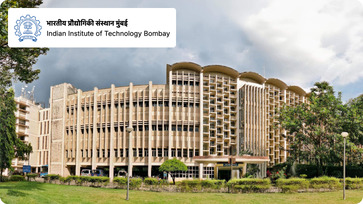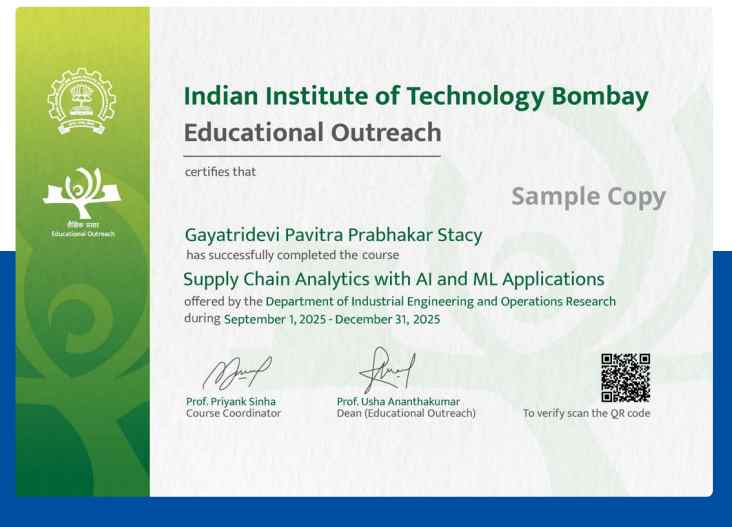Download Brochure
Check out the program and fee details in our brochure
Thanks for your interest!
An advisor will be reaching out to you soon.
Not able to view the brochure?
View BrochureGet details on syllabus, projects, tools, and more

Application closes 5th Mar 2026
Designed and delivered by IIT Bombay faculty
Weekly live sessions for learning and query resolution
Industry-relevant curriculum with case-based teaching methodology
Online curriculum designed for working professionals
AI topics and techniques woven throughout the curriculum
Peer-to-peer learning and networking opportunities
Personalised assistance from a dedicated Programme Manager
Certificate of Completion from IIT Bombay

NIRF India Innovation Rankings, 2024
QS World University Rankings, 2026

NIRF India Engineering Rankings, 2024
QS Rankings in Engineering & Technology, 2025
Module 1: Introduction to Data-Driven Supply Chain Analytics
Module 2: Supply Chain Network Design and Optimisation
Network design underpins cost-effective, resilient supply chains. This module covers supplier selection methods (WSM, AHP, DEA) and the construction of deterministic and stochastic location-allocation models. You’ll implement mixed-integer programs in Python, evaluate trade-offs between the number of facilities and service levels, and run sensitivity analyses to stress-test your network against disruptions.
Topics Covered:
Module 3: Demand Forecasting and Planning
This module dives deep into forecasting methods, contrasting classical time-series models (ARIMA, exponential smoothing) with machine learning approaches such as decision trees, SVMs, and neural networks. You’ll learn to measure and minimise forecasting errors, incorporate leading indicators, and even prototype GenAI-driven demand simulators. By the end, you’ll know how to select the right model for a given context and integrate forecasts into planning systems.
Topics Covered:
Module 4: Data-Driven Inventory Models
In this module, you’ll master inventory-control frameworks that adapt to real-time data and uncertainty. From dynamic EOQ formulations with time-varying parameters to data-driven Newsvendor models and multi-period stochastic control policies, you’ll build models in Python to compute optimal reorder points and safety stocks. This module will demonstrate how Artificial Neural Networks can learn demand patterns and trigger automated replenishment.
Topics Covered:
Module 5: Transportation and Risk Analysis
This module will focus on the last mile and beyond as you explore dynamic vehicle-routing problems, multi-modal transportation analytics, and risk-modeling techniques. You’ll learn tobuild learning-based route-planning algorithms, quantify disruption and price volatility risks, and employ GenAI for scenario-based contingency planning.
Topics Covered:
Curriculum review and changes are under the purview of the faculty and would be undertaken from time to time to ensure the coverage is in line with industry requirements.

Note: Image for illustration only. Certificate subject to change. Certificate will be awarded only to learners who successfully meet the completion criteria.
Learners will build an end-to-end understanding of supply chain analytics and take both planning and execution related decisions, leveraging data and AI. Specifically, they will learn how to:

Interested candidates can apply by filling out a simple online application form.

Go through a mandatory screening call with the Registration office.

Selected candidates will receive an offer letter. They must pay the registration fee to confirm their seat and complete the registration.
Advantageous but not mandatory:
Registrations Open